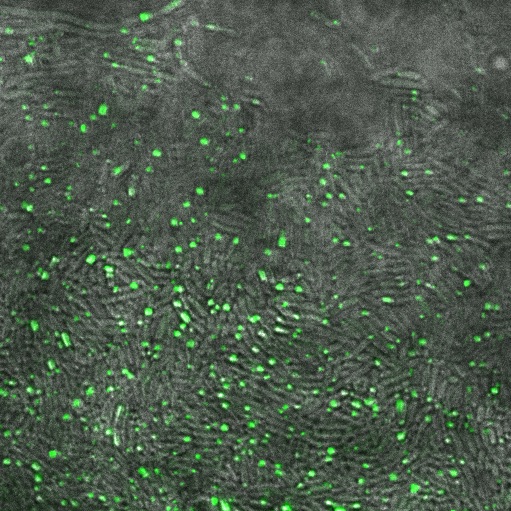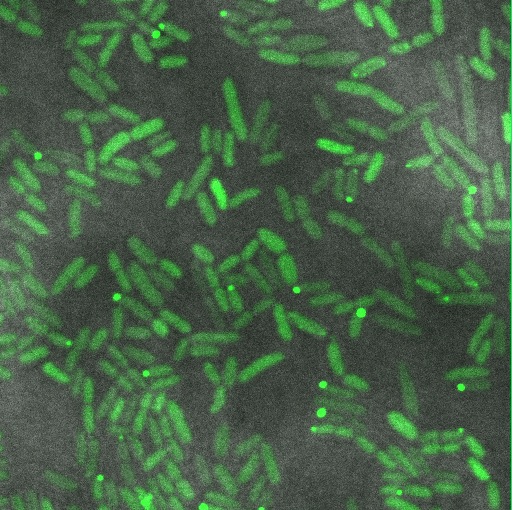Difference between revisions of "Part:BBa K638301"
| Line 2: | Line 2: | ||
<partinfo>BBa_K638301 short</partinfo> | <partinfo>BBa_K638301 short</partinfo> | ||
| − | E.coli transformed with this construct will produce a superfolder | + | E.coli transformed with this construct will produce a [[Part:BBa_I746916| superfolder GFP (BBa_I746916)]] fused variant of Reflectin A1 under the control of the [[Part:BBa_I0500 | pBAD promoter]], an arabinose inducible protein. There is currently (at the time of writing) no good assay for reflectin in vivo. However, this construct allows reflectin to be localised within the cell. This part has been used to view reflectin containing inclusion bodies in E.coli and the sfGFP retained its fluorescence despite the fusion. |
The Reflectin A1 gene is under the control of the pBAD promoter [[Part:BBa_I0500 | BBa_I0500]], which is tightly controlled by two factors: | The Reflectin A1 gene is under the control of the pBAD promoter [[Part:BBa_I0500 | BBa_I0500]], which is tightly controlled by two factors: | ||
*'''L-arabinose''' monosaccharide taken up by the cell from the medium, which acts as an ''inducer''. | *'''L-arabinose''' monosaccharide taken up by the cell from the medium, which acts as an ''inducer''. | ||
Revision as of 00:09, 22 September 2011
Arabinose inducible Reflectin A1-sfGFP fusion generator
E.coli transformed with this construct will produce a superfolder GFP (BBa_I746916) fused variant of Reflectin A1 under the control of the pBAD promoter, an arabinose inducible protein. There is currently (at the time of writing) no good assay for reflectin in vivo. However, this construct allows reflectin to be localised within the cell. This part has been used to view reflectin containing inclusion bodies in E.coli and the sfGFP retained its fluorescence despite the fusion. The Reflectin A1 gene is under the control of the pBAD promoter BBa_I0500, which is tightly controlled by two factors:
- L-arabinose monosaccharide taken up by the cell from the medium, which acts as an inducer.
- AraC protein included in the I0500 biobrick, which acts an a repressor.
Therefore, the araC-pBAD system offers regulatable control of gene expression in the presence of the inducer and highly repressed in the absence of the inducer. Read more about [http://2011.igem.org/Team:Cambridge/Experiments/Low_Level_Expression the pBAD and arabinose system in E.coli].
Sequence and Features
- 10COMPATIBLE WITH RFC[10]
- 12INCOMPATIBLE WITH RFC[12]Illegal NheI site found at 1205
- 21INCOMPATIBLE WITH RFC[21]Illegal BamHI site found at 1144
Illegal BamHI site found at 1240 - 23COMPATIBLE WITH RFC[23]
- 25INCOMPATIBLE WITH RFC[25]Illegal AgeI site found at 979
- 1000INCOMPATIBLE WITH RFC[1000]Illegal SapI site found at 961
Illegal SapI.rc site found at 2307
Usage and Biology
Best used in an E. coli chassis such as strain [http://cgsc.biology.yale.edu/Strain.php?ID=111773 BW27783], with constitutive expression of an Arabinose transporter. See our experience of pBAD for some issues with tuning expression levels.
Cambridge 2011 used this part to assess reflectin folding on different backbones.
Reflectin-GFP on pSB1A3(a high copy plasmid), induced with 1mM Arabinose. Fluorescence is localised in dots at the end of the cells, indicating that fusion protein is localised to insoluble inclusion bodies.
Reflectin-GFP on pSB3K3 (low/med copy plasmid), induced with 1mM Arabinose. The fusion protein is distributed throughout the cytoplasm, indicating soluble protein is expressed.
From this confocal imaging, we recommend that reflectin be expressed on a low/med copy number backbone to allow protein folding to occur to give soluble protein. High copy number plasmids give inclusion bodies. Some inclusion bodies are also visible in the low copy construct, suggesting that some cells are expressing more fusion protein than others. See our experience of the pBAD promoter for a discussion of variations of induction within a population of cells.
Safety
The protein coding sequence for reflectin originally came from cells of an edible squid. There have been no reported safety issues for reflectins, so we do not anticipate the need for extra precautions when using this BioBrick part. See our [http://2011.igem.org/Team:Cambridge/Safety safety page] for more information.


